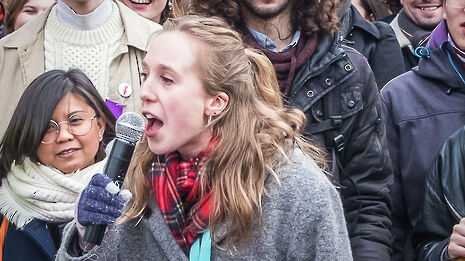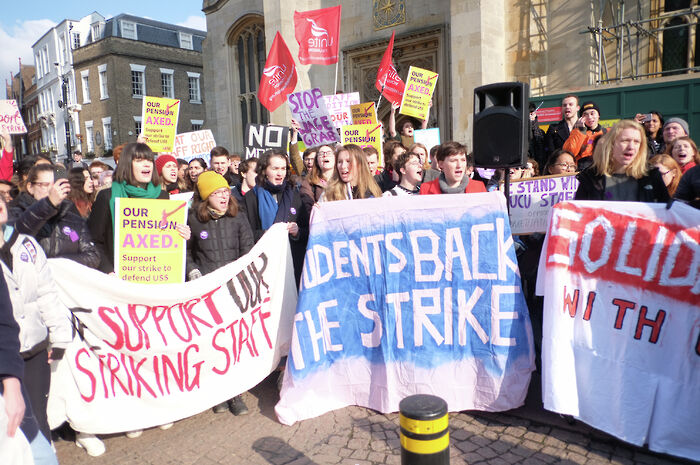CUSU called to back petition for strike refunds
The motion will be voted on alongside another which asks the student union to condemn alleged “aggressive harassment” of students by picketing staff

CUSU Council will be asked to vote on two motions about the ongoing staff strikes on Monday: one calling on the student union to condemn allegations of ‘harassment’ of students by striking staff, and another to back a petition calling for students to receive reimbursement for teaching lost across the fourteen days of planned industrial action.
The motions put pressure on CUSU to adopt a more student-focused approach in their actions and words towards the walkouts, which have so far been marked by broad alignment with stances taken by the striking academics’ union, the Universities and Colleges Union (UCU).
The first motion asks CUSU to show its support for a new petition, which asks Cambridge to provide “a proportional refund of our tuition fees for contact hours lost due to the strike”. The petition currently has less than thirty signatures.
It follows another petition to Cambridge vice-chancellor Stephen Toope, signed by around 1,100 students, calling for students whose teaching has been disrupted to receive £300 in reimbursement from the University, saying: “We judge this to be a fair share of the £9,000 annual tuition fee that we already pay to this University that we will lose in the anticipated cancellation of lectures and supervisions.”
CUSU officially adopted policy on the strikes in late January, when Council voted for the student union to show solidarity and support with the strikes. During that vote, CUSU resolved to lobby the University, and to encourage students not to break picket lines.
CUSU does not currently have a mandated stance on refunds for lost teaching. The student union itself – most visibly represented on the issue of the strikes by president Daisy Eyre and education officer Martha Krish – has remained quiet on the issue.
The issue has split many supportive of the strike: some claim that any calls for reimbursement reinforce the ‘marketisation’ of higher education while others, including several Cambridge UCU members, have argued that calls for refunds would would make the strike more disruptive, and therefore more effective.
Cambridge UCU Branch Secretary Dr. Waseem Yaqoob added that “students should press for an end to the disruption any way they see fit”.
Last week, women’s officer Lola Olufemi – who is mandated by the women’s campaign, rather than directly by CUSU Council – spoke against calls for refunds at a student rally.
The motion, proposed by Katie Marsden, a Murray Edwards student, notes: “We reject the commercialisation of education, however in some cases students’ education has been severely disrupted by the strike action.” The motion states that “this petition will be a constructive way to support the strike by maximising the inconvenience to the University” and that “financial reimbursement is a fair request and in the interests of students”.
Marsden told Varsity: “By calling for a refund we are highlighting that this system fails for universities as well as students, and it shows the University how conscious students are forced to be of their finances these days. This can be a gateway to a further discussion about the marketisation of education with the University.”
The motion is joined by an emergency motion proposed by Christ’s JCR vice-president Oliver Jones, and Homerton JCR vice-president Ben McGuigan, which calls for CUSU to “condemn aggressive harassment of students choosing to cross UCU strike picket lines”.
The motion says “there have been of reports of Supervisors making inappropriate comments to students as well as reports of students being called ‘scabs’ and grabbed as they enter university buildings” and that “a number of libraries have not been waiving library fines and so some students are forced to cross pickets under fear of financial concern to themselves”. It notes that UCU’s official strike policy is for picketers to not interfere with those deemed to be “not in dispute”.
Several students have spoken to Varsity about the challenges and disruptions produced by the strikes, which started on and will begin again on Monday. In one case, a second-year Law student said that he was told “go and f*** yourself,” after he told picketers that he supported the strike action but still needed to attend the lecture for his educational benefit.
The motion calls on CUSU to “release a statement condemning any allegations of misconduct, reiterating CUSU’s support for the strikes while emphasising that some students must cross lines and their choice to do so must be respected”, to provide “guidance to students who are concerned about working relationships with supervisors/lecturers post-strike”, and to offer welfare support to students affected by harassment at the picket lines.
Jones and McGuigan told Varsity: “Both of our respective JCRs absolutely support the strike. However, feedback from our student bodies regarding CUSU’s involvement with to day to day welfare on the matter has been largely negative.”
The said that while “the majority of picketers have been” peaceful, both their JCRs “have received complaints from students about comments made by supervisors, as well as harassment received when going to lectures or returning overdue library books,” saying “we were both concerned about the lack of support from CUSU for students who are required to cross picket lines as part of their daily routine.”
They stressed their support for CUSU’s solidarity with students, but criticised the student union’s alleged lack of regard for students who work has been affected.
“CUSU has done a brilliant job in supporting striking lecturers, organising teach-outs and providing alternative study spaces,” they added. “However, there has been very little acknowledgment that many students simply cannot afford to miss those contact hours that are not cancelled. Unfortunately, CUSU’s support for lecturers has precluded communication on how students should support themselves, and deal with any concerns caused by picketers. By no means do we feel that CUSU’s inaction has caused these reports of harassment, but their public communications have touched this critical student welfare issue only once.”
“As a result,” they said, “CUSU’s stance on students who do cross picket lines remains unclear, and there is a lack of advice on the rights of students as non-strikers who are trying to access university buildings.”
 News / Judge Business School advisor resigns over Epstein and Andrew links18 February 2026
News / Judge Business School advisor resigns over Epstein and Andrew links18 February 2026 News / Gov grants £36m to Cambridge supercomputer17 February 2026
News / Gov grants £36m to Cambridge supercomputer17 February 2026 News / Hundreds of Cambridge academics demand vote on fate of vet course20 February 2026
News / Hundreds of Cambridge academics demand vote on fate of vet course20 February 2026 News / CUCA members attend Reform rally in London20 February 2026
News / CUCA members attend Reform rally in London20 February 2026 News / Union speakers condemn ‘hateful’ Katie Hopkins speech14 February 2026
News / Union speakers condemn ‘hateful’ Katie Hopkins speech14 February 2026











